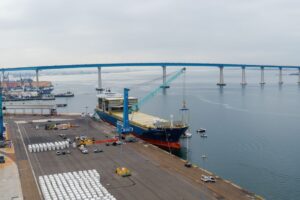On a mission to lead the regional maritime trade and logistics services of Tanzania towards excellence, the Tanzania Ports Authority (TPA) are vital to developing the country’s role as a leading hub for maritime operations serving the region’s ports and facilities for more than 20 years. Since its establishment, TPA has been delivering vital port operations and developing the essential infrastructure to serve the country’s trade industry, as well as the trade of the surrounding hinterland.
Check out the article in the magazine below:
For over two decades, TPA has been operating the ports serving Tanzania and its neighbouring countries via its diverse system of sea and inland waterways across the country. The port, established in 2004 by the Ports Act No.17, today operates as a landlord and operator of the country’s major seaports, as well as many other smaller seaports and lake ports. Across all of its port locations and operations, TPA are delivering world-class services across Tanzania’s maritime industry, to sustain trade on both a local and international scale. In Tanzania, TPA oversees 3 main seaports, which include Dar es Salaam, Tanga and Mtwara.
Dar es Salaam alone is vital for Tanzania’s international cargo trade, with the port being responsible for handling around 95% of the country’s international trade, with a rated capacity of 14.1 million metric tons of dry cargo, and an additional 6.0 million metric tons of bulk liquid cargo. Due to the port’s significant capacity, 2,600 metres of quay, and 11 deep-water berths, it is the principal port for the country. With the infrastructure to handle large quantities of cargo, the Port of Dar es Salaam today services many key landlocked countries in Africa, including Zambia, the Democratic Republic of Congo (DRC), Burundi, Rwanda, Malawi, Uganda and Zimbabwe. However, even beyond the port’s links with local trade to neighbouring countries, the port is also playing a key role in international markets across places such as the Middle East, Europe, Australia and America.
The Dar es Salaam port is also linked with the Tanga Port, which helps enhance the country’s trade and maritime operations. The Tanga Port and the various seaports under TPA along the north of the country provide Tanzania with further interconnectedness that continues to help deliver the country as a hub for local and international trade within Africa. In addition to the seaports of Tanzania, TPA also oversees some key lake ports, including the Lake Nyasa Ports, Lake Tanganyika Ports, and the Lake Victoria Ports. These lake ports help to further extend TPA’s trading power across the country and allow it to better position itself as a key shipping country along the East African coastline.
Across these sea and lake ports, TPA are focused on providing the necessary facilities, development and coordination to deliver them as hubs for trade. A significant aspect of this trade is facilitated through TPA’s cargo services, which provide world-class cargo operations supported by the Authority’s highly skilled personnel. The combination of advanced technology and years of expertise has ensured that the port can provide safe, reliable, and seamless handling of maritime cargo, which meets the highest standards across the international cargo sector.
In terms of cargo types, Tanzania sees containerised, break-bulk, dry bulk and bulk-liquid cargoes. Typical dry bulk cargo handled by TPA includes rice, wheat, maize, beans, fertiliser, sugar, cement, sodium nitrate, gypsum, and coal, as well as iron and zinc ores. For break bulk, TPA sees iron, steel, metals, motor vehicle parts, trailers and parts, agri-products, machinery, copper, railway vehicles, tractors and tractor parts, as well as containers. Then for bulk-liquid, the most commonly transported products include crude oil, petroleum products, chemicals, liquified natural gas (LNG) and edible oils. These products allow TPA to play a key role in many industries, including food production, manufacturing and even energy development. Therefore, with such a variety of products being moved through the ports of Tanzania, TPA continue to expand its offering to serve these industries on both a local and international scale, bringing with it economic development for Tanzania and the surrounding region.
Across all of TPA’s operations, its stakeholders remain vital to every development. TPA works with government agencies, shipping lines and banks to help deliver the smoothest port experience for customers across all of the ports in Tanzania. By working so closely with such stakeholders, TPA can develop Tanzania’s import and export markets, supported by laws and regulations to deliver world-class operations that are competitive on a global scale. In August, TPA highlighted its commitment to working alongside its stakeholders as it held a Stakeholders Meeting on Cargo Transport Through Central Port. The meeting outlined the steps TPA has taken to improve the infrastructure of Tanzanian ports, including the establishment of better IT systems as part of this. The meeting engaged private sector stakeholders, which included the likes of port operators, to work alongside them to increase the efficiency of handling domestic and international cargo across Tanzania.
The Deputy Director General of the event, Dr Baraka Mdima, outlined the importance of stakeholders participating in the session, as these are essential in understanding the challenges facing the transport sector. By working with these stakeholders, TPA can help deliver more efficient, cost-effective and simplified trade opportunities through the central corridor to deliver significant returns for the ports and the stakeholders. Dr. Mdima also reiterated TPA’s commitment to continuing to work with its stakeholders to ensure the future of the Central Corridor and maintain its role as a modern, efficient trade corridor delivering significant economic development to Tanzania and the surrounding countries.
In July, TPA announced that I had signed an agreement on Standard Operating Procedures (SOPs), which will aid the transfer, storage and transportation of cargo from the Port of Dar es Salaam to the Kwala Dry Port. The agreement involved key cargo stakeholders in the country, including TPA, the Tanzanian Railways Corporation (TRC), and the port operators, DP World and the Tanzania East Africa Gateway Terminal Limited (TEAGTLG). The Director General of TPA, Mr. Plasduce Mbossa, outlined that the agreement is designed to reduce the time it will take to unload cargo at the port, reduce congestion for large vehicles, increase efficiency and reduce cargo handling costs. Therefore, this agreement outlines the role of each institution across Tanzania’s transportation chain to enhance the overall transportation of cargo from the Dar es Salaam port, highlighting each stakeholder’s role in delivering such a vital transportation development.
Across Tanzania, TPA are providing leading regional maritime trade and logistics services to deliver significant economic benefits for the country and the surrounding region. With the country providing a vital gateway to many neighbouring landlocked countries on the East Coast of Africa, Tanzania is a vital hub for trade, traversing international shipping lines to arrive at one of the many key ports serving the region. In recent months, TPA have highlighted just how valuable cooperation across the country’s entire cargo industry is with the meeting of key stakeholders to deliver Tanzania as a global cargo gateway for Africa. Therefore, with the support of local stakeholders, TPA can continue to develop the country’s maritime sector and deliver it as a vital hub for global trade.








